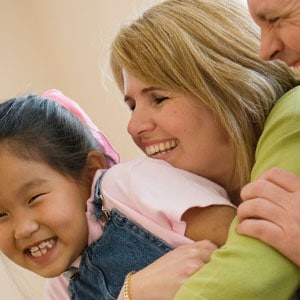
The Christian’s Response to the Fatherle
Listen to today's broadcast and discover three key points each one of us should consider as we ask God how we can be advocates for orphans worldwide.
Show Notes
About the Host
About the Guest
-
Listen to today's broadcast and discover three key points each one of us should consider as we ask God how we can be advocates for orphans worldwide.
-
Dave and Ann Wilson
Dave and Ann Wilson are hosts of FamilyLife Today®, FamilyLife’s nationally-syndicated radio program. Dave and Ann have been married for more than 38 years and have spent the last 33 teaching and mentoring couples and parents across the country. They have been featured speakers at FamilyLife’s Weekend to Remember® marriage getaway since 1993 and have also hosted their own marriage conferences across the country. Cofounders of Kensington Church—a national, multicampus church that hosts more than 14,000 visitors every weekend—the Wilsons are the creative force behind DVD teaching series Rock Your Marriage and The Survival Guide To Parenting, as well as authors of the recently released book Vertical Marriage (Zondervan, 2019). Dave is a graduate of the International School of Theology, where he received a Master of Divinity degree. A Ball State University Hall of Fame quarterback, Dave served the Detroit Lions as chaplain for 33 years. Ann attended the University of Kentucky. She has been active alongside Dave in ministry as a speaker, writer, small-group leader, and mentor to countless wives of professional athletes. The Wilsons live in the Detroit area. They have three grown sons, CJ, Austin, and Cody, three daughters-in-law, and a growing number of grandchildren.
-

Dennis and Barbara Rainey
Dennis and Barbara Rainey cofounded FamilyLife®, a ministry of Cru®. Their 43+ years of leadership enabled FamilyLife to grow into a dynamic and vital ministry in more than 109 countries. Together they have spoken at over 150 Weekend to Remember® marriage getaways and authored or co-authored more than 35 books, including best-selling Moments Together for Couples, Staying Close, A Symphony in the Dark, and Barbara’s most recent, Letters to My Daughters: The Art of Being a Wife...more
Dennis and Barbara talk about three key points to consider as we ask God how we can be advocates for orphans worldwide.
The Christian’s Response to the Fatherle
Bob: Shouldn't the things that are on the heart of God also be on the heart of His children? Here's Barbara Rainey.
Barbara: [from videotape] The church has, for many, many years been very strongly pro-life, but we've not been equally pro-adoption. Adoption is God's idea. Adoption is a Christian response to the results of sin and depravity. See, Bible doesn't command us, believers, to adopt, but it does command us to visit and care for the orphans in their distress, and for some of us that will mean choosing to adopt.
Bob: This is FamilyLife Today for Wednesday, November 15th. Our host is the president of FamilyLife, Dennis Rainey, and I'm Bob Lepine. What can we do to show our concern for the millions of children growing up worldwide without a mom or a dad? Stay tuned.
And welcome to FamilyLife Today, thanks for joining us on the Wednesday edition. This week our focus is on those who need our attention, need our help, who need hope, and it's also on a partnership that has emerged with a lot of partners all joining hands together to say, "Let's get together and do something about this."
Dennis: It's a rally cry called "The Voice of the Orphan," and it's a call to the Christian community to say, you know what? Find something that you can do on behalf of the orphan. Perhaps it's here in America around the foster care system. Maybe it's overseas, maybe it's through your local church, maybe it's just you as a family, but find a way to express the heart of God for an orphan. Because there is a God-sized opportunity today that is demanding faith, obedience, and I believe sacrifice of the Christian community if we're going to make a difference. Over 143 million orphans worldwide, many created by the HIV-AIDS crisis, tsunamis, earthquakes, civil wars, lots of things taking place, Bob, that contribute to this, but the bottom line it's an opportunity for the Christian church.
Bob: This is something that's been on your heart for a number of years not only as an adoptive parent but in the last several years FamilyLife has established a ministry called "Hope for Orphans," and in recent days other ministries have developed a heart for this issue as well, and it's all kind of happened independently, and everybody kind of looked around and said, "Really? This is happening with you? Well, it's happening with us, too," and that's what led to all of these organizations coming together and saying, "We can do more together than we can do independently."
Dennis: I'm going to tell you something, Bob. I've been in ministry 35 years, and there's a handful of times that I can count where the footprints of God were all over something, and this whole issue of orphans, I’m telling you, in the words of C.S. Lewis, "Aslan is on the move." God is on the move. He is doing something powerful, unique, and it's a great opportunity for families. This is a family-made opportunity for you to join in with God and, as Henry Blackaby talks about, one of the great privileges of life is to join God in what He's doing and Christ Him in the process.
What a great privilege we have today around the issue of orphans.
Bob: And this is something that is on the heart of God and, in fact, you had a chance to speak to that subject recently at your home church with your wife Barbara. You talked about how we ought to respond as the body of Christ to the needs of the orphan, and you had five points, and we've already heard this week the first two of those. We're actually going to pick up in the middle of point 2. What was the first one?
Dennis: Well, the first one is that we need to respond to this crisis by pleading with the Father for the fatherless.
Bob: We need to be prayerful as we approach this subject.
Dennis: Jeremiah 33:3 – "Call to me, and I will answer you and show you great and mighty things, which you do not know." And you know what? In this situation, we need God to act. This is beyond any human organization or institution or even group of institutions to be able to address.
The second thing that we challenged folks to do in this message is to find ways to go near orphans, and I quoted John 14:18 where Jesus said, "I will not leave you as orphans. I will come to you. The God of the Universe came near." And you know what? He modeled how He cared for his orphans. Shouldn't we model how we should care for His orphans as well?
Bob: You have had opportunities to go near even in recent days while you were in South Africa recently, you visited orphanages over there, and your wife, Barbara, and some of your daughters have had opportunities to go near and, in fact, as we pick up part 2 of your message, Barbara is talking about a recent opportunity when she and your daughter, Laura, went to care for orphans in China.
Barbara: [from audiotape] On our second trip to China in 2004, Laura and I were part of a team of doctors and nurses. The group was organized by FamilyLife's Hope for Orphans ministry. We spent a week in the city of Tanjin, which is a city of millions of people, in China, giving each of the – over 300 children in just one orphanage, medical exams. They were evaluated, and we began to make charts and keep records for all of these kids, because they'd never been treated medically.
All the non-medical people on our team were assigned each to a doctor as an assistant. Laura worked with Dr. Paul, who was a neonatologist, and they weighed and measured and took vital statistics on every child in that orphanage.
But there were two of us in our group who were sort of leftovers. We weren't assigned to a specific doctor, and we didn't have a specific job, and so we eagerly, actually, asked if we could just go into the baby room, and could we just hold babies all day every day, and they said "Yes." And so we did.
We held babies with cleft palates who had not had surgery yet. We held babies who had heart conditions and who probably weren't going to live. We held babies who seemed perfectly normal, and I remember thinking, "Why are you here in this orphanage?"
But there was one little tiny baby that I couldn't stay away from. She was so little, like a brand-newborn baby that I couldn't just let her lay in her crib, so I held her as often as the workers would let me, and I began to worry about her. She didn't each much when they fed her because as soon as she quit eating, they would lay her back down again, and I knew she needed more.
When her turn came the next day to be weighed and evaluated, I followed her over to the clinic like a mother hen to wait anxiously for the results. She weighed five pounds, and she was six weeks old. By now, my friend and I, Lynn, had named her Sarah.
The next day our group went to another town to do some evaluation on another group of children, but when we got back to the orphanage that afternoon, Lynn and I made a beeline for the baby room. We had to go check up on our little baby. I went straight to Sarah's little crib, and even though the room was very dark, as it was every day, I bent over that little crib, and I could tell immediately that something was wrong. Little Sarah was turning blue, and she wasn't breathing very well.
I picked her up, got the workers' attention, the workers grabbed her from me and rushed off. We went and got the doctors, including Dr. Paul, who managed to intercept her, got her to a hospital, resuscitated her and hooked her up to an IV. Before we left the orphanage at the end of that trip, Little Sarah was still in the hospital, but we knew she was going to live, and we were relieved. We also managed to get her vital information including her Chinese name and date of birth. We wanted to keep track of her after we'd come back to the States, and we also hoped and prayed that someday somebody might adopt her.
Sarah is now the daughter of Dr. Paul, the neonatologist who saved her life, and she lives in Texas.
Dennis: There is a third way that we can obey God, and I'm not going to spend a lot of time on this, but it's give sacrificially. There are plenty of us who may be too old to adopt, and maybe not have the ability to go, but we can give. We can be a part of being tethered financially to the orphan community. Maybe it's to an orphanage, maybe it's to a child. I'd like to encourage you to consider funding a child as a family through a relief organization. Just make sure that that relief organization is a member of the ECFA, the Evangelical Council for Financial Accountability. It's the stamp of approval that your dollars are going to be used for their intended purpose.
We did this a number of years ago, in fact, gave up a meal once a month when the kids were little and ate rice and took the money that we would have spent on that meal to sponsor a child in another country. Maybe you need to come alongside an orphanage, financially consider supporting them, an adoption agency, a crisis pregnancy center, or a ministry that is an advocate for orphans. And I'd like to challenge this body with yet another thought. There is a new kind of church emerging across the country that has a heart for the orphan and wants to pay 100 percent of the adoption expenses for any family that wants to adopt.
John Piper and his church at Bethlehem Baptist in Minnesota has got a huge heart for the orphan, and there are others like him. Some of them have seen literally hundreds of orphans adopted through their church, and it's cost the adoptive family nothing financially. Give sacrificially.
The fourth way that we have to obey our Heavenly Father's command to care for the orphan is to help empty the state's foster care system. I want to introduce you to a couple who didn't empty the system but who are, indeed, foster care heroes. Charlie and Cookie Wilson have been members of Fellowship for a quarter century. They have been quietly performing pure religion by caring for the needs of the orphans.
They have a son and two daughters, one daughter who is blind and the other who came to them while they had four other children on Easter, but they decided they could take one more. She was supposed to have stayed only three or four days but instead she stayed three years. And then they adopted her. Her name is Sarah.
Eight percent newborns, one after another, they kept taking care of them. They gave the boys a blue Bible and the girls a pink one. Who knows where those Bibles have ended up? Eighty-two children from the foster care system. To me, that is pure and undefiled religion. Would you all stand up? Ann, Charlie, Cookie.
[applause]
One last thought before we get to our final point – there are 415 adoptable children in the foster care system in the state of Arkansas. What if this church and a couple dozen others decided to empty that out? Do you think that's a noble cause that we ought to consider as a Christian community?
There is one last way we can get involved.
Barbara: Number five is become pro-life and pro-adoption. The church has, for many, many years been very strongly pro-life, but we've not been equally pro-adoption. Alvin J. Schmidt writes in his book, "Under the Influence," how Christianity transformed civilization, and in the first century, infanticide, which is the killing of newborn infants, was very widespread. But the Christians, the new believers, in the first century after Christ opposed this practice as their response to honor God's command against murder.
They also practiced Romans 12:2, which say, "Do not be conformed to the pattern of this world but be transformed by the renewing of your mind." And so they frequently took in these castaway children into their homes and adopted them. They saw child abandonment as a form of murder. Adoption is a Christian response to the results of sin and depravity. Adoption, as we've already talked about, is God's idea.
As a teenager, I dreamed of adopting a child someday, but after Dennis and I got married, we soon began having children, and we realized in several short years that we didn't have much trouble getting pregnant. So we didn't talk much about adoption in those early years.
Dennis: And, frankly, I'd never thought about adoption in my entire life until I married her.
Barbara: But after eight years and four children, we still wanted to expand or family, but I wasn't – I just wasn't interested in getting pregnant again, and so we talked about adoption, and we decided we would see if God might add to our family through that avenue.
Dennis: And we kept talking about adoption.
Barbara: Yeah. One day in 1983 we got a call. There was a baby available if we were still interested, and we were, and so our adoption journey began. This is a photo of the day that she came home, and this is a photo of her with me and one of our sweet little daughter with her daddy.
Today this little girl is 23. She is married to Jason and lives in Chicago. Because she had a mommy and a daddy and a stable home, she knows what marriage and family is supposed to look like. She knows the basics of how to be a mother and a wife. She, most importantly, knows Jesus Christ as her Savior and Lord. You see, adoption is another form of evangelism. It's the way we, as the church, the family of God, can reach out to children's lives around the world and introduce them to the Gospel of Christ. Solving the problem of orphans is challenging, but adoption is one of the solutions.
Secondly, adoption is the normal Christian life. God adopts us lost children into His family, and He puts us where we can learn of Him and His ways.
And, number three, adoption should only be done if God calls you to do it. See, the Bible doesn't command us, as believers, to adopt, but it does command us to visit and care for the orphans in their distress and, for some of us, that will mean choosing to adopt some of these orphans.
For Dennis and I, raising an adopted daughter has been one of the greatest blessings of our lives. It has also been one of the greatest challenges. Without Deborah, our lives would have been insulated, predictable, and safe. Without Deborah, we would have not understood God's heart of love and compassion for the lost and the lonely – the orphan and the fatherless. Without Deborah, we would have missed on our lives and on our family's lives the touch of God's hand, the touch of the Master's hand.
Our adoption story is not a fairy tale. Most adoptions aren't. God's adoption story of us is not a fairy tale, either. Most of us have wandered from his love; most of us have rebelled against Him and broken His heart. But the story is not finished. Until we reach heaven, there is much work to be done for the millions and millions of fatherless around the world, and it is God's adopted children, you and me, who must go and meet this need.
Dennis: I got a glimpse into what kind of culture we have when I had the privilege about a year ago to speak at a crisis pregnancy center fundraiser. In the process, I interviewed the ladies who give leadership to that CPC in North Little Rock, and I asked them about how many girls they touched on an annual basis. It was about 900. Of that 900, how many were pregnant that you ended up helping, one way or the other? They said 300.
And I said, of the 300, how many of those 300 placed their babies in homes for adoption? Their heads fell, and they held up one finger. You see, we are a pro-abortion culture but you know what? I wonder if the reason why Roe v. Wade has not been overturned is because the Christian community has not been pro-adoption. Because if it was overturned, what would happen to the literally millions of babies that would be born who would no longer be aborted, and who would not become children of single parents who would need to be adopted. Is the Christian community ready for that?
Bob: Well, once again, we have been listening to part 2 of a message that you and your wife Barbara shared recently with your home church, Fellowship Bible Church in Little Rock on the needs of the orphan. I don't know how many of our listeners have thought about orphan care as a pro-life issue, but it's fundamentally a pro-life issue.
Dennis: Absolutely, in fact, I have to believe, Bob, if the Christian community would become unashamedly pro-adoption, I think our message of pro-life would have so much more integrity, so much more of a ring of compassion, and as I concluded this message, I made one single point. I said, "You know what? You can't do everything, but you and your family can do one thing." What is your one thing?
Bob: And adoption may be a response, but it's not the only response. We're talking about meeting the needs of the orphan and some families – in fact, most families – won't adopt, but all families can respond to that need.
Dennis: And one of the great needs today, Bob, I am convinced more than ever, what needs to happen in every church in America is that we need an orphan care and adoption ministry in every church. If we had that kind of ministry in every church, I believe within 10 years we would see a dramatic turnaround worldwide when it comes to the needs of orphans.
Would it mean that we've solved all the problems concerning orphans worldwide? Absolutely not. I mean, 143 million? That's like several nations that don't have parents, don't have families. The needs associated with that are staggering. But you know what? There's over 300,000 churches in America. What if there were 300,000 churches that had orphan care and adoption ministries in their church? I believe we'd make a huge impact, and I think instead of seeing only 100,000 children adopted in America annually, I think we could see that number increasing substantially in the coming years.
Bob: Our team has put together a new book called "Launching an Orphan's Ministry in Your Church," that provides a step-by-step guide for a church to do just like that and, in fact, Michael Easley, the president of Moody Bible Institute, shares the same vision you were just talking about. On the back of the book he says, "If every church in America would prayerfully set a goal to establish a ministry to care for orphans, it would literally change the world. And I think he's right.
This book offers a step-by-step guide to walk a church through the process of starting a ministry and includes a DVD that can be used to help launch this in your church, help cast a vision for an orphan's ministry in your church. You can request a copy of this book when you go to our website, FamilyLife.com, and click the red button in the middle of the screen that says "Go." That will take you right to a page where there is more information not only about this book and the enclosed DVD, but there is also information about how to get a copy of the message we've been listening to this week from you and your wife, Barbara. It's available on DVD on our website as well.
Again, the site is FamilyLife.com. You click the red button that says "Go," in the middle of the screen, and that will take you right to the page where there is information on how to order these resources, and you will find a link there to the Voice of the Orphan website. It's VoiceOfTheOrphan.org, and on that website you'll see a listing of all of the ministries that share this vision for caring for the needs of the orphan – Focus on the Family, Shaohannah's Hope, and more than four dozen other ministries that have come together to say, "Let's do something about this worldwide crisis."
When you go to the Voice of the Orphan website, and, again, it's VoiceOfTheOrphan.org, you can download a document that includes 10 ways every Christian can care for the orphan and the waiting child, and that's available free from the Voice of the Orphan website, VoiceOfTheOrphan.org, and again there's a link to that website on our site, FamilyLife.com. If you need help with any of these resources, and you don't have Internet availability, simply call our toll-free number. It's 1-800-F-as-in-family, L-as-in-life, and then the word TODAY, and we'll get someone on our team to help you get these resources sent out to you.
I want to say a quick word of thanks today, Dennis, if I can, to those folks who help support the ministry of FamilyLife Today. I know for many of them they share our vision for seeing marriages and families strengthened, being able to provide practical, biblical help for couples and families all across the country and around the world through this daily radio program on this station and on stations in other cities as well, and I want you to know that when you help support the ministry of FamilyLife Today, you are also helping us get the word out about the need of the orphan, and you're helping us mobilize organizations and churches to help respond to that need.
So we appreciate your financial support. We're listener-supported, and your contributions are vital for the ongoing ministry of FamilyLife Today. This month when you make a donation of any amount, we'd love to send you a prayer guide for parents called "While They Were Sleeping." It gives you 12 different topics you can be praying for for your children or your grandchildren along with suggested prayers each week as you focus on a different topic.
Request a copy of that prayer guide when you make your donation online. And you do that by filling out a form online, and then you come to a keycode box. Type in the word "pray," p-r-a-y, and we'll know to send you a copy of this hardback book that will help guide your praying for your children, or simply call 1-800-FLTODAY, make a donation over the phone and mention that you'd like a copy of the book, "While They Were Sleeping," or the prayer guide for parents, and we'll be happy to send that out to you.
Again, it's our way of saying thank you for your financial support of this ministry. We appreciate your partnership with us.
Well, tomorrow our friend, Steven Curtis Chapman, is going to join us, along with his daughter, Emily. You may have heard him tell the story of how he and his wife, Mary Beth, decided to adopt their child, Shaohannah at the urging of their daughter, Emily. Tomorrow we'll hear Emily's side of that story, and I hope you can be with us for that.
I want to thank our engineer today, Keith Lynch, and our entire broadcast production team. On behalf of our host, Dennis Rainey, I'm Bob Lepine. We'll see you next time for another edition of FamilyLife Today.
FamilyLife Today is a production of FamilyLife of Little Rock, Arkansas, a ministry of Campus Crusade for Christ.
We are so happy to provide these transcripts to you. However, there is a cost to transcribe, create, and produce them for our website. If you’ve benefited from the broadcast transcripts, would you consider donating today to help defray the costs?
Copyright © FamilyLife. All rights reserved.




